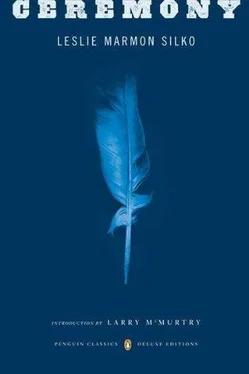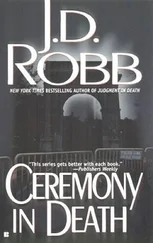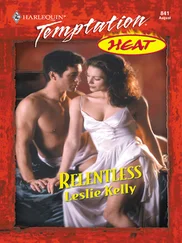He got up and went outside. The sun was behind the clouds, and the air was cool. There were blue-bellied clouds hanging low over the mountain peaks, and he could hear thunder faintly in the distance. He walked north along the road. A year before he had ridden the blind mule, and Harley rode the burro. Pa’to’ch was standing high and clear; months and years had no relation to the colors of gray slate and yellow sandstone circling it. Only the sky had changed, washed clear of the dust and haze which had swirled off the red clay flats the summer before. He could smell wild flowers growing in the weeds and grass beside the road, and he heard the big bumblebees and the smaller bees sucking the blossoms. The flowers were all colors of yellow that day — silky yellow petals like wild canary feathers, and blossoms as dark as the center of the sun.
He found flowers that had no bees, and gathered yellow pollen gently with a small blue feather from Josiah’s pouch; he imitated the gentleness of the bees as they brushed their sticky-haired feet and bellies softly against the flowers.
He continued north, looking to the yellows and the orange of the sandrock cliffs ahead, and to the narrow sandrock canyons that cut deep into the mesa, exposing the springs. He was wondering about the speckled cattle, whether they had pushed their way through the fence and were halfway to Mexico by now. They had been so difficult to control in the beginning; they had taken so much from Josiah.
He left the road and took a trail that cut directly to the cliffs, winding up the chalky gray hill where the mesa plateau ended in crumbling shale above the red clay flats. The sun felt good; he could smell the juniper and piñon still damp from the rain. The wind carried a wild honey smell from meadows of beeweed. The trail dipped into a shallow wash. The sand was washed pale and smooth by rainwater and wind. He knelt and touched it. He pulled off his boots and socks and dug his toes deep into the damp sand; then he started walking again. Up ahead, a snake stopped and raised its head alertly; the tongue slid in and out and then stopped when it located him. It was a light yellow snake, covered with bright copper spots, like the wild flowers pulled loose and traveling. It crossed the wash and wound its way up the slope, disappearing into the grass. He knelt over the arching tracks the snake left in the sand and filled the delicate imprints with yellow pollen. As far as he could see, in all directions, the world was alive. He could feel the motion pushing out of the damp earth into the sunshine — the yellow spotted snake the first to emerge, carrying this message on his back to the people.
She was walking through the sunflowers, holding the blue silk shawl around her shoulders in one hand, carrying the long curved willow stick in the other. She turned to him as soon as he saw her, as if she had been waiting. The nights of soft dreaming of her were suddenly locked tight in his chest, and his heart beat fast.
“I’m camped up by the spring,” she said, pointing at the canyon ahead of them. “Here, this way. I’ll show you.”
She sat in the shade of the willows that grew beside the pool, below the overhang of the cliff. She sat with her legs straight out in front of her, holding the red calico skirt in both hands, pulled tight around her legs like trousers. She wiggled her bare toes and looked up at the sandstone cliffs where the swallows were inside their round mud nests, making high-pitched noises. The shadows of the willow leaves made her skin look mottled and dark, the way the iron deposits streaked the yellow sandstone cliffs dark orange.
He squatted in the sand at the edge of the pool and looked into the shallow clear water. The sand at the bottom caught the color of the sun, and tiny green leaves grew out of this color, suspended in the still water. Shiny black water beetles pushed across the bottom of the pool, leaving trails of tiny air bubbles twisting to the surface. Except for the rustle of the swallows, and a mourning dove calling from the mouth of the canyon, it was quiet. The sunlight moved up and down his back like hands, and he felt the muscles of his neck and belly relax; he lay down beside the pool, across from her, and closed his eyes.
He dreamed he made love with her there. He felt the warm sand on his toes and knees; he felt her body, and it was as warm as the sand, and he couldn’t feel where her body ended and the sand began. He woke up and she was gone; his fists were full of sand and he was sweating. The sun had moved across the sky, and he knew he had slept for hours. He washed his face in the water; the surface water was still warm, so he plunged his hands deep into the cool layer above the yellow sand. As he walked from the pool to the place she had been sitting, the moisture on his hands and face evaporated. He looked for an imprint of her feet or the outline that the cloth of her skirt made in the sand. As he moved through the grass around the pool, a small green frog wiggled out of the weeds ahead of him, and splashed into the pool. He felt shaky inside: what if there were no traces of her, no lines of sand pressed by her body, no delicate track of her blue shawl trailing into the weeds?
The imprints were there; he traced his fingers lightly along them. He had not dreamed her; she was there as certainly as the sparrows had been there, leaving spindly scratches in the mud.
“I’m over here,” she said. Her voice came from the east side of the narrow canyon. He scrambled over the big rocks; a chipmunk skittered ahead of him; he was afraid she would disappear like the echo her voice made. His bare feet and the ends of his toes were raw from the sandrock. He stood on the boulder above her, breathing hard. She was sitting on the edge of a sandy bank beside a big moonflower plant. The blue silk shawl was spread open by her feet, and she had filled it with freshly dug roots and leaves from many different plants. She gathered up the shawl without looking at him and climbed up the rock to join him.
They climbed a steep trail where niches for toes and fingers had been worn into the yellow sandrock after centuries of use. She pulled herself to the top with a branch of bearberry shrub, and offered him her hand. Coming over the edge, the canyon and the rock of the cliff seemed suddenly gone as if he had stepped from the earth into the sky; where they were, the sky was more than half the world; it enclosed the mesa top where they stood.
“You never told me your name,” he said.
“I’m a Montaño,” she said. “You can call me Ts’eh. That’s my nickname because my Indian name is so long. All of us kids did that.”
He nodded. “We did that too, at home. Nicknames.” He thought about Rocky then; his baptismal name had been Augustine, and “Rocky” had been as close as he had wanted to come to the Indian name old Grandma’s sister had given him. “You have brothers and sisters,” he said, wanting to find out about her.
“Yes,” she said, looking off into the distance, toward the Black Mountains in the south. “We are all very close, a very close family.”
He started to ask where they were then, where they lived, because he had only met the hunter; but her eyes were shining, and they told him things that her words never said.
“I have a sister who lives way down that way. She’s married to a Navajo from Red Lake.” She pointed south, in the direction she was looking. “Another lives near Flagstaff. My brother’s in Jemez.” She stopped suddenly and laughed. “You know what they say about the Montaños.” The tone of her voice said that of course he knew what the people said about her family, but Tayo couldn’t remember hearing of that family.
“Up here, we don’t have to worry about those things.” She was right. They would leave the questions of lineage, clan, and family name to the people in the village, to someone like Auntie who had to know everything about anyone.
Читать дальше












